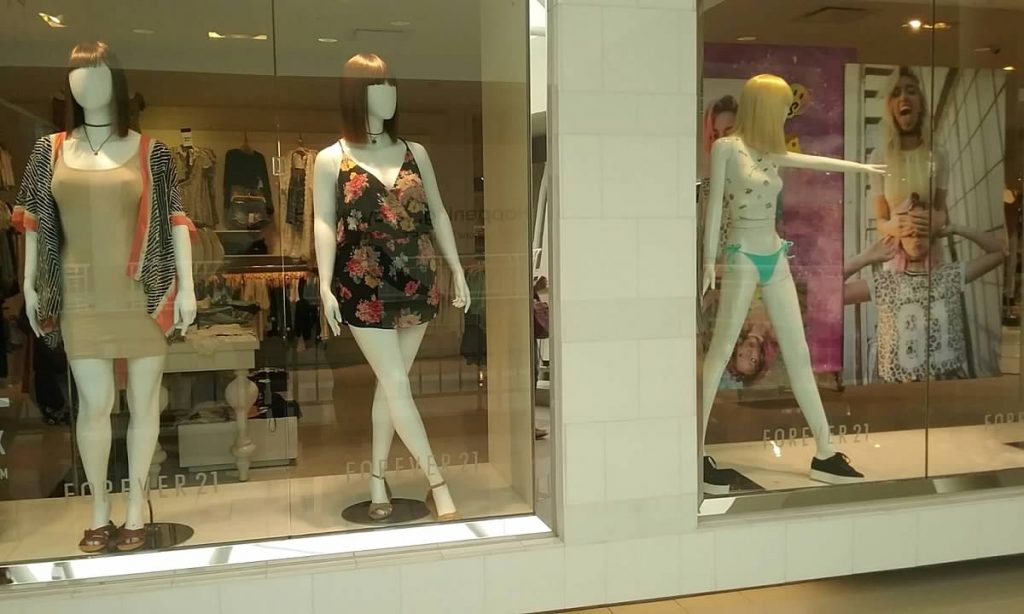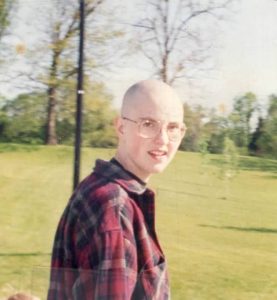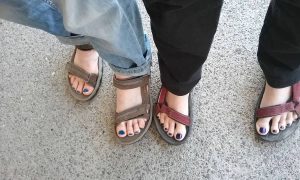By Amanda Crowell

As I watched a recently released post-apocalyptic film with our teenage daughter, the inevitable tank-top scene came, and I was, as always, disappointed. In a world of grime, sweat, fear, isolation, and survival, somehow the women always seem to find time to shave. I took the time to point out the silliness of that detail to my daughter, not because I am a rabid anti-shaver, but because the realities of bodies are very rarely represented on screen, and I don’t want her to grow up thinking that what she sees from Hollywood or video game avatars is what she should expect from the beautiful range of bodies she will encounter through her life. Many of us are still struggling to accept our bodies and make choices that are comfortable for us as we face heavy social pressure without supportive communities.
I stopped shaving the first time after I graduated from college. I began working for an outdoor learning center and encountered Kris, an energetic fellow program staffer who had stopped shaving when she was training for her certification in wilderness rescue. I had never met a woman who didn’t shave, at least not one who was recognizable as such. (I had taken a class on Amish history and culture that included a dinner with an Amish family. The dress of the women would not have revealed the unshaven state of their limbs.) Kris wore shorts and tank tops without any hint of self-consciousness. I envied her the lightness and freedom she projected and decided to give it a go myself. Kris wasn’t the only one bucking the body norms; staffer Keith refused to wear deodorant or put his clothes in the dryer. Neither were dirty; both were just very real about their bodies. In my middle-class, white, small-town upbringing, I had never encountered such things.
Not shaving was fantastic. My razor burn went away. I gained about an hour a week simply from not wasting my time in the shower. I stopped needing band-aids after butchering my legs yet again in the shower without my glasses. My mother, paragon of body criticism, actually said nothing. For the whole summer, we were natural people together, and the kids at camp rarely said anything. If they did, we just said, “It’s part of nature, as we all are.” Then I left that beautiful, nature-centered bubble and went to graduate school. My midwest urban graduate school was not a hotbed of alternative anything. After a month of stares and titters from my peers and my students, I started shaving again.
Living in a supportive community can make alternative choices easier to sustain; sadly, the converse is also true. Being isolated from supportive, body-positive communities can prevent choice in a very real way, or any kind of body-awareness exploration. This isolation also helps perpetuate existing prejudices that open communication and healthy examples can dissipate. Making choices for our own bodies is often met in mainstream culture with extreme negativity, and the consequence is often emotional devastation.
 Hair of all kinds is negatively policed by mainstream culture. Man-buns. Bald “dyke” women. Ronald McDonald hair. Mermaid-wannabe. Dreads or braids seen as unprofessional. When I shaved my head in college, I was followed in stores by security and salespeople. I was pulled over constantly. I was called a “man” by those who knew better. Luckily, I was also able to find out who the truly loving and accepting people in my life were just by dint of erasing my hair. The only man to ask me out declared in response to my surprise, “I may be straight, but I’m not narrow.” He was, however, distinctly in the minority. My colleague’s son is sometimes commented on negatively by complete strangers because he has resisted getting his hair cut, and at three has beautiful long locks. One of my African American students told me her food service job told her she couldn’t wear a wig, her hair style of choice, because it “looks trashy.” A drunk relative once offered to trim my hair for me because the way I’d had it cut made me look “too old.” The comments cannot be escaped, even though how a person wears their hair has no bearing on how anyone else lives.
Hair of all kinds is negatively policed by mainstream culture. Man-buns. Bald “dyke” women. Ronald McDonald hair. Mermaid-wannabe. Dreads or braids seen as unprofessional. When I shaved my head in college, I was followed in stores by security and salespeople. I was pulled over constantly. I was called a “man” by those who knew better. Luckily, I was also able to find out who the truly loving and accepting people in my life were just by dint of erasing my hair. The only man to ask me out declared in response to my surprise, “I may be straight, but I’m not narrow.” He was, however, distinctly in the minority. My colleague’s son is sometimes commented on negatively by complete strangers because he has resisted getting his hair cut, and at three has beautiful long locks. One of my African American students told me her food service job told her she couldn’t wear a wig, her hair style of choice, because it “looks trashy.” A drunk relative once offered to trim my hair for me because the way I’d had it cut made me look “too old.” The comments cannot be escaped, even though how a person wears their hair has no bearing on how anyone else lives.
Ten years after the first gloriously hairy summer, I was a married mother of a toddler. Married life was not what I had thought it would be, and I wanted to find myself again. I stopped shaving; my then-husband only noticed after three weeks, and recoiled in disgust. He was very clear that making that decision about my own body was unacceptable in the context of our marriage. His experience of women had been the inculturation of porn, magazines, and Hollywood that a young man in mainstream culture tends to get.
Ten years after that failed experience, I married a man who accepted my choices about my body as beautiful―but even that was a challenge. Not from him, but from other women, who made offhand comments about how he was a saint anyway, of course he would be okay with anything. These comments made me feel defensive; I began preparing a fight in my head. “Shaving is oppression!” “Shaving is an unhealthy obsession with young girls!” “Shaving is denying that we are as human as men!” “Shaving is a commercial scam!”
But I didn’t not shave for these reasons. I chose not to shave because I wanted my time free, my legs uncut, and my skin not to itch all winter. Trying to be true to my own body choices without support outside of my husband―though thank goodness for him―actually created a hostility in response to the hostility I was receiving. Shaving is a choice, and as a feminist, I support women making their own choices whether or not to shave. This is not a widespread support engendered by all self-identified feminists, however, and without a supportive community, I had a hard time either staying with how my body felt comfortable or refraining from giving back the hostility I encountered with my own.
A hostile defensiveness is often the response even before any criticism is made, possibly because in our social isolation we have come to expect critique instead of support. During a discussion on the problems with tactics of the anti-abortion movement in which we were in agreement, one former coworker declared angrily that she did not see what the fuss was about; she asserted that nobody mourns a miscarriage, so why should a chosen abortion be any different. I observed calmly in the face of her unexpected statement that I had, in fact, mourned my miscarriage. She yelled, “Sad for you. I certainly don’t regret my abortion!” and stormed out of the room. She had been ready to be attacked, and attacked others first as a result.
 A colleague who has preferred to rely heavily on medical intervention to have her child is known for repeatedly explaining everything about why she made her choices for IVF, C-Section, and formula feeding even though we have not asked or said anything negative, and we’ve been very supportive of her choices as being the best for her―no explanation needed. As someone who is choosing what’s not publicly popular, though, I understand her defensive reaction.
A colleague who has preferred to rely heavily on medical intervention to have her child is known for repeatedly explaining everything about why she made her choices for IVF, C-Section, and formula feeding even though we have not asked or said anything negative, and we’ve been very supportive of her choices as being the best for her―no explanation needed. As someone who is choosing what’s not publicly popular, though, I understand her defensive reaction.
Worse is the almost-hostile preaching of some of those who have chosen an alternative. Sometimes they seem to have gone through defensiveness and into pushing others into making the same choices, possibly out of a natural desire not to be alone in their choices. Thoughtlessly pushing others to wear particular styles of clothing, have a baby, not have a baby, worship in a non-mainstream way, eat a particular way, not shave, or vote alternatively rather than considering what the other person’s needs and feelings are is just as bad and as isolating as criticizing alternative choices―but can be a symptom of feeling unsupported in choices just as much as a hostile defensiveness is.
Open hostility in reaction to defying social norms is pervasive at all ages. On seeing a curvy woman on campus wearing very short shorts, a female student walking nearby commented, “Wow, they’re letting streetwalkers in now.” I leaned over and said, “You know, if I had legs like hers, I’d show them off, too.” I left the student with her mouth open. My intervention was driven by my memories of my own mother telling countable-ribs teenaged-me that the men’s work jeans I was wearing to mow the lawn made my butt look big. An older woman I once thought was my friend offered me a large check to buy new glasses, as the ones I’d picked out a week earlier, “Clearly don’t fit [my] face.” A male colleague once looked at my oversized sweater and wrap-around silk skirt and called me a sherpa. Wearing all black led to an accusation of “being a hipster,” while a colorfully patterned skirt was “Are you trying to be 12?”
Women aren’t the only ones who encounter this negativity about appearance; my transgender daughter (still presenting as male at the time) was told her rainbow hat that she’d requested I knit for her was too girly a hat by one of her kindergarten classmates. She was so scared by these types of classmates that she insisted in a panic we find nail-polish remover in the morning before school after she’d proudly painted her nails blue the night before. I have heard colleagues make derisive comments about tattoos on students and other colleagues. Without others who look like us to reassure us that we are making acceptable choices, it’s hard to be comfortable in our own bodies, and our social structure of isolation and homogeneity encourages constant criticisms.
Hypersensitivity about our bodies’ messes and odors because of pervasive criticism can cause problems that reverberate throughout our lives. I know a couple who can only have sex after a shower and who shower again after because the wife has been inundated with those “Not so fresh” commercials and comments about how women “smell like fish” from locker-room guys. As a consequence, their sex life is almost non-existent. One of the bathrooms on our floor at our work is a “scent-free” bathroom after some colleagues took to masking any body odors with multiple different commercial scents in large quantities, causing allergic reactions in other colleagues.
 In my own life, I did not learn until meeting Keith that I could wear an outfit or use a towel more than once before washing it, so emphatic had been my upbringing that the scents of the human body were something to be cleansed at all costs. Since I switched to Gladrags (cloth menstrual pads), I have found that other women are often repulsed by the idea. If asked for a spare tampon, I mention I used reusables and so don’t have one. “Gross! That’s so nasty. We’ve evolved past cavemen, you know,” are standard responses.
In my own life, I did not learn until meeting Keith that I could wear an outfit or use a towel more than once before washing it, so emphatic had been my upbringing that the scents of the human body were something to be cleansed at all costs. Since I switched to Gladrags (cloth menstrual pads), I have found that other women are often repulsed by the idea. If asked for a spare tampon, I mention I used reusables and so don’t have one. “Gross! That’s so nasty. We’ve evolved past cavemen, you know,” are standard responses.
Family may be a resource for some; my sister and I can laugh and share our stories of perimenopause and funny genetics. She has been my cheerleader even when she didn’t understand why I was making the choices I did. That is an unusual openness for my family, though, as some of the women in my family couldn’t even say “breast” unless it referred to a chicken dinner.
It is hard for many of us to know when we can open up to each other to talk about our bodies to find out what is normal if we have to be worried about getting called gross all the time. Our Bodies, Ourselves is a great resource, and I was thrilled to find the 1972 printing of the More Joy of Sex features illustrations with full body hair on both men and women. Recently I discovered a long-time colleague and friend had stopped shaving; we had both been so shy about possible criticism that neither of us realized the other didn’t shave!
We do have the internet to find each other, but the internet is as fraught with problems as it is solutions. From natural-body-hair activists in commercials fielding threats of rape to “funny” memes about “effeminate” man-buns bouncing around Facebook, the bad that comes with a search for like-minded digital folk almost negates the positive. There is positive to be found, though. I found some truly horrible things, but I also found Esther Emry, a homesteader who proudly declares she was raised never knowing that shaving was necessary. Beautiful men and women who do not look like magazine models are proud to share their fun outfits, their favorite hairstyles, and their full-on body reality. Just never, ever read the comments.
The value of a supportive community cannot be understated, particularly relating to body image. I am still navigating finding support, giving support, and dealing with body-centered criticism in a non-hostile way. I have learned to sometimes playfully poke the critical folks back―“Really? Well, Frida Kahlo had a mustache just like mine, and I think she was gorgeous!”―as well as to simply minimize contact with more constant critics. While my close friends may not be as hirsute as I am, they know I will support their body choices and be open to talking about the navigation of cultural pressures on their bodies because they see me dealing with the same pressures. I hope I help make them brave enough to color or not color their hair, shave or not, dress funky or dress in a style they’ve never tried, be it formal or athleisure, or just enjoy the hike instead of worrying about the sweat.
 Do I wish I could see more women who make similar body choices as me? Heck yeah, and I still get very anxious sometimes in situations where I know my appearance will be under particular scrutiny. I’ve even broken down and shaved for a few of them rather than deal with the pressure. I remind myself that sometimes, mainstream culture requires a costume to get the candy. Wearing a costume can be fun sometimes, too, as long as it’s ultimately our choice. The main lesson is to support others’ choices, particularly those who may not be able to live in a community with others whose choices make them feel comfortable about their own. I was lucky enough to find such community at different times in my life, and there are many such represented by this magazine, which has also long bolstered my confidence.
Do I wish I could see more women who make similar body choices as me? Heck yeah, and I still get very anxious sometimes in situations where I know my appearance will be under particular scrutiny. I’ve even broken down and shaved for a few of them rather than deal with the pressure. I remind myself that sometimes, mainstream culture requires a costume to get the candy. Wearing a costume can be fun sometimes, too, as long as it’s ultimately our choice. The main lesson is to support others’ choices, particularly those who may not be able to live in a community with others whose choices make them feel comfortable about their own. I was lucky enough to find such community at different times in my life, and there are many such represented by this magazine, which has also long bolstered my confidence.
Sometimes, just normalizing choices for the next generation can be enough. Last summer, I walked into the living room wearing a hairy-armpit-baring tank top and work pants, sweaty from hours of garden work. I looked post-apocalyptic, if I do say so myself. My daughter looked up briefly from her book. “You,” I told her, “have a badass mom.” “Yeah,” she replied, going back to her reading, “you get used to it.”
Amanda Crowell is a bisexual mom, wife, writer, teacher, and eco-enthusiast living in mid-state New York, where in the winter, no one can see you anyway, no matter what you look like.
This is an online-only article associated with the Summer 2019 edition of Communities (#183), “Sexual Politics.”
